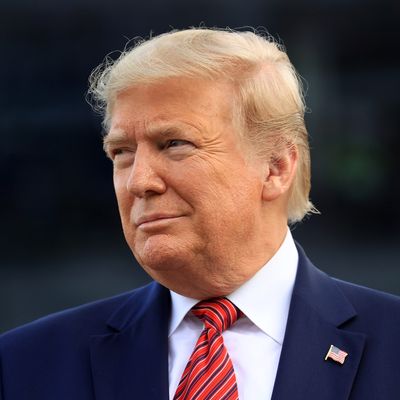
The idea that Donald J. Trump is a president best defined by his weakness has always carried a kind of knowing, world-weary authority. It’s basically the Washington Republican response when you’re freaking out about Trump’s incessant power grabs. Calm down, they tell us; he’s not really effective; he’s a shiny object to keep non-college-educated whites in the GOP’s grip; we’re still having elections; he’s only behaving like presidents before Watergate; the economy is fine; he’s more in touch with America than the rest of you. And so on.
And I should say I really, really want to believe Republicans when they say this. I’d love to adopt a more laconic and nuanced attitude in these nerve-racking times, and I’m worried about my blood pressure. I’m not hostile to every part of the Trump policy agenda, and I can happily accept some mitigating factors in Trump’s defense: Some rogue courts that have denied legitimate presidential authority (especially in immigration matters) only to be rebuffed in the end by SCOTUS; worrying errors in the FISA process early on (Carter Page, ahem); bureaucratic resistance rooted in ideology and partisanship; the shift of the mainstream media into a woke cul-de-sac; and the fever-swamp Maddowism that tried to re-up the Cold War to shore up the reputation of Hillary Clinton. These are points worth taking.
I also admire the sangfroid of some non-hysterics. In an age of high emotionality, the calm-down chorus has managed to summon up an air of coolness, detachment, moderation. To take one of the more persuasive advocates of this basic position: New York Times columnist Ross Douthat. He argued a while back that the best way to see the Trump administration was more as LBJ than Mussolini. This week, he described the Trump era as a “black comedy” — something unmistakably dark but ultimately unserious. On February 1, Ross made the broader case that Trump is “a reckless and distracted figure, a serial squanderer of opportunities, who barely won the presidency and whose coalition is united only in partisan solidarity and fear of liberalism. He may not be removable by the impeachment process, but is not a king; he is a widely hated, legislatively constrained president facing a difficult re-election … A failed impeachment doesn’t give him new powers or new popularity.”
And that’s where I get off the calm-down bus. The way Trump has been operating since he was acquitted by the Senate suggests to me that he is quite obviously seeking and practicing new powers, as he has been since he was sworn in; and that he has been rewarded, chillingly, with new popularity despite or because of it. He has brazenly pardoned a whole slew of his political allies and personal friends, initiated a purge of anyone in government who exposed malfeasance, fired an acting director of National Intelligence because an underling warned of Russian interference in the 2020 election, and kept suggesting to a judge that if she returned a harsh sentence for one of his goons, Roger Stone, he would almost certainly commute it or pardon Stone entirely. (Since Judge Amy Berman Jackson’s moderate sentence on Thursday, Trump has refused to take a pardon off the table.)
And to make sure we fully understand and witness what he’s doing, he has also declared himself as “I guess, the chief law enforcement officer” of the United States, and made a series of very public assertions that he can do anything he wants in the criminal-justice sphere. For all this, he is at 49 percent high in the Gallup poll, at a yearslong peak of 44.2 percent in the FiveThirtyEight poll of polls and 46 percent in RealClearPolitics’ average.
Yes, presidents before Trump did bad things we would today deplore (like spying on domestic political opponents). Yes, they committed impeachable offenses which did not lead to exposure, let alone removal from office. Yes, some flouted the rule of law. And, yes, we have tightened standards of executive accountability since Watergate. But no president, however malign, has ever declared that he has an absolute right to commit abuse of power — while he was doing it. Even when Nixon said, “When the president does it, that means that it is not illegal,” it was way after his departure from the White House, and prompted gasps. What Trump is doing is openly mocking constitutional constraints on the presidency even as he abuses his office — and has prompted only indifference among Republicans and exhaustion among Democrats.
Look at the precedents that have already been set: A president can now ignore Congress’ power of the purse, by redirecting funds from Congress’ priorities to his own (as in the wall); he can invent a “national emergency” out of nothing and exercise powers that are, at their worst, dictatorial (as Trump did to fund his wall); he can broadly refuse to cooperate with any legitimate congressional inquiries — and defy all congressional subpoenas (as he did with impeachment); he can, reportedly, order illegal acts and promise his subordinates he will subsequently pardon them if they are discovered; he can dangle pardons, obstruct justice, and intimidate witnesses with impunity; he can slander judges and accuse the FBI and CIA of being part of a seditious “deep state.”
He can wage war unilaterally and instantly, without any congressional approval, while lying about the reason (what Iranian imminent attack?) and denying the consequences (the serious injuries that were inflicted on U.S. service members in Iraq); he can stack his Cabinet with many lackeys who never have to undergo Senate hearings — because they’re only ever “acting” Cabinet members; he can threaten media entities (like Amazon) with antitrust actions because of negative coverage; and he can leverage American military aid against Congress’ wishes in order to get a foreign government to smear his potential political opponents and describe it as a “perfect” presidential act. We also know that a president in this polarized deadlock will almost never be subject to a veto override — and that the judiciary is being packed with adherents to untrammeled executive power.
Are we supposed to believe these precedents will not be cited and deployed by every wannabe strongman president in the future? Are we supposed to regard these massive holes below the waterline of the ship of state as no big deal? And with these precedents in his first term, are we supposed to regard what could Trump get away with in a second term as a form of black comedy? I’m sorry but I don’t get the joke.
And look at the latest response to Trumpism among some Establishment Democrats: a multibillionaire autocrat who admires the Chinese system of government, effectively harassed an entire generation of brown and black Americans as mayor of New York City, and finagled a previously impermissible third term in that position! Yeah, let’s elect the guy who already fixed the system to extend his time in office! That’s a huge shift — and a big win for the elected monarchy Trump understands the presidency to be. We’ve had business-dictator wannabes before — think Ross Perot — but not an entire possible presidential race between two moneyed, outsider authoritarians. “Ripe for tyranny?” We’re begging for it.
We’ve also learned that the appeal of rank, tribal demagoguery has not waned. After all the shocks and scandals, and all the violations of key norms and practices, the cult of Trump is as strong as ever. One chilling fact: In New Hampshire, in the Republican primary, basically uncontested, almost 130,000 people showed up to vote for their president. At a similar point in their reelection bids, Bush and Obama only mustered about half that number in the state.
This is a cult. It’s sustained by constant fanatical rallies, buoyed by a campaign of deliberate falsehoods, and thriving in an alternate reality created by a media company’s propaganda. This is more dangerous than a monarchy, because it is based on charismatic authority, not tradition. And Trump’s demagogic and Twitter skills remain underrated by too many who can’t see the menace behind the circus. The economy, meanwhile, is strong — thanks in part to adding a trillion more dollars each year to the debt — and people at the bottom of the ladder are actually seeing real wage gains for the first time in a long while. It is therefore more likely than not that this president will be reelected.
If that happens, every authoritarian precedent being set now will be given deeper democratic legitimacy. Yes, this is exactly how republics die. As in Rome, the forms remain, but the essence has shifted — away from democratic discourse, separation of powers, compromise and coalition and toward cultish, one-man strongman presidencies, buoyed by the tribal loyalties of half the country.
And that, of course, is not the worst option. Competing cult leaders is bad enough; but our current president is also threatening the integrity of our elections by his indifference toward foreign influence, his refusal to commit to obeying an election result in advance, his grotesque past claims of voter fraud, and his toying with a third or fourth term. Last year, Trump tweeted a GIF that showed him winning elections in 2024, 2028, and on and on. And it was one thing to swallow all this gamesmanship and trolling from a rogue candidate in 2016 — but from a sitting president heading into an election year? And then we have a genuine potential nightmare: If the election is close, can we be sure that the president will accept the result, and act in the interests of the country, rather than himself?
With Trump, for the first time in the history of the presidency, the answer is no. If you have followed this man’s business career, or witnessed the last three and a half years, you will notice that Trump never concedes anything. So why do we assume he would concede an election? And who would make him? And when you examine the nature of the party he has now remade in his image, and observe its evolution in recent decades, you see that the GOP’s core belief seems to have become that the other party is inherently illegitimate, and must be crushed by any means to hand. Which means to say that the GOP is a party now dedicated to the maintenance of its own power before any other principle. That was the core meaning of Trump’s nomination. It means that we have no idea if we’ll see a normal transfer of power this fall if the president loses.
I’m sorry not sorry to be a Cassandra about this — and I sure hope I’m wrong. But confronted with this reality, it is staggering to me that anyone can say we should chill. The nature of Trump’s instinctual tyranny is that it never stops by itself. And, like any psychological disorder, it never rests. It has an energy all its own. Each new beachhead of power is simply a means to acquire more of it in an ever-more ambitious and dynamic form. This is not a comedy; it’s a tragedy we want to believe is a comedy. Because the alternative is too nightmarish. A Kierkegaard quote, of all things, popped on Twitter this week that seemed to capture the dynamic beautifully: “A fire broke out behind stage at a theater. The clown walked out to warn the public and they thought it was a joke and they applauded. He repeated it; the acclaim was even greater. I think that’s exactly how the world will end: to generous applause from wits who think it’s a joke.”
Haha, as the kids say. Haha. Now that’s a black comedy.
Having Enough of Experts
The surest economic forecasts made in the 2016 referendum campaign were that Brexit would be a catastrophe for the British economy. This was the view not only of the Remain campaign but of the U.K. government itself. The Treasury published a formal set of prognostications about Brexit’s economic impact in 2016 and they were grim: a recession immediately after the vote to leave, a jump in unemployment, and a soaring deficit. This was not a warning about the possible long-term future economic impact of Brexit, but about the immediate aftermath of the vote. And the Treasury was wrong. In the following three quarters, they predicted a cumulative decline of 0.3 percent, which would put the U.K. formally into a recession. In fact, growth has increased by 1.4 percent. There was no recession; and none has subsequently arrived.
Unemployment was 4.9 percent in mid-2016; in early 2020 it’s down to 3.8 percent, a near record low. More interesting is the employment rate: “The number of employed people rose by a sharp 180,000, its strongest in two years, and helped push the employment rate to another record high of 76.5%.” So Brexit has brought a bunch of people previously outside the workforce inside it, and generated more jobs than ever before. Compare Britain’s unemployment rate with France’s (8.1 percent) or Italy’s (9.8 percent) or Spain’s (13.8) or, more broadly, the eurozone (7.4).
Growth? Last year, the U.K. had slightly higher growth than the rest of the E.U., and the IMF just predicted that the U.K. economy would also grow marginally faster than the eurozone countries for the next two years, as long as there isn’t a screwup in the transition out of the E.U. During the referendum campaign, leading Tory and Leave politician Michael Gove was widely mocked for saying that Britons “have had enough of experts” when talking about the economy and Brexit. But it turns out that 51 percent of the people were right and almost all the experts were wrong.
But now the real test. A key factor in Brexit was control of mass immigration. And mass immigration often favored low-skilled workers in service and health industries — giving businesses cheap and easy labor on demand. With the new immigration law proposed by Boris Johnson, that cheap labor will disappear, as non-skilled immigrants will be barred. A points system for all migrants will be applied, restricted largely to skilled workers with a job offer and fluent in English.
Will that hurt growth? One mitigating factor is that the new government has allowed all current E.U. citizens to stay in Britain if they want — and 3.2 million have applied to. As for those jobs now filled by cheap migrant labor? The government points to a population of 8 million Brits currently deemed economically inactive who could fill those gaps. And then the government simply calls on businesses to adjust — by training U.K. workers, and raising wages to retain and attract employees in a tighter labor market: “It is important that employers move away from a reliance on the U.K.’s immigration system as an alternative to investment in staff retention, productivity and wider investment in technology and automation.”
It’s too soon to see how this will work out — but it’s something to judge the Johnson government by. If growth continues, if the transition out of the E.U. is smooth, if immigration levels decrease and wages for unskilled workers go up, then Boris will have fundamentally reshaped the British economy to help the unskilled working class. That will be a huge vindication for Brexit and Johnson if it pans out — and could realign British politics for a generation. It might reinvigorate the American economics-of-immigration debate as well.
Inconvenient Pioneers
Every now and again, I take a moment to take stock of how deep gay integration has gotten in my adult lifetime. This past week, our politics featured two relatively young men, on both sides of the political divide, whose sexual orientation is both clear and irrelevant. Pete Buttigieg has been at the top of the field in Iowa and New Hampshire, one of seven remaining candidates, and in the circular flamethrower squad of Wednesday’s debate, he once again held his own. More than that: He was relentless in his attacks on Amy Klobuchar and more than a little blunt about Bernie Sanders’s plans to take private health insurance away from everyone (something that doesn’t even happen in socialized health care in Britain). There was not the slightest whiff of defensiveness about him.
His moderate politics (on most subjects) is filtered through a seemingly brutal, calculating Rhodes Scholar–style ambition. And why can’t gays as well as straights harbor that? It’s fantastic also that he is a man of Christian faith — like countless other gays and lesbians in America. Who would have imagined that the pioneering gay figure of 2020 would be a married Christian who got a standing ovation in a Fox News town hall? But that’s old news now.
It’s also fantastic that, for the most part, his sexual orientation is ignored. Yes, the queer left hates him — but they hate a lot of gay success in public life if it doesn’t exactly fit their ideological niche. And Rush Limbaugh indeed took a slightly homophobic dig the other day. But I doubt Trump would openly use Pete’s orientation as a way to demean him. And that’s not just because Trump is not personally homophobic but because he knows it would look ugly, and be counterproductive. That’s how far we’ve come.
Richard Grenell has not subjected himself to getting elected anywhere, but, like Buttigieg, he’s a classic careerist D.C. meritocrat (and why the fuck not?). From the heartland, he got a degree from Harvard’s Kennedy School and then attached himself to Republican pols — notably George Pataki and George W. Bush, who made him communications director for the U.S. seat at the U.N., a post he held for seven years. Launching his own communications shop, Grenell subsequently worked Fox News gigs even as he was a signatory to an amicus brief in defense of the right of gay couples to marry. By all accounts he has been a disaster as ambassador to Germany, trolling the E.U. and German elites, although I doubt Trump sees his regular Twitter provocations as a liability.
But check out a simple video of Grenell being sworn in for the Germany job. Mike Pence, of all people, officiates as Grenell’s longtime partner, Matt Lashey, holds the family Bible. This week his appointment as acting director of National Intelligence was widely panned — and is not expected to last long. But he nonetheless became the first-ever openly gay member of the Cabinet in U.S. history. You missed that? All the better. But for some of us, it’s a quiet landmark tarred only by the fact that most gay groups won’t even acknowledge it. The Human Rights Campaign’s Twitter feed has made no mention at all — even as they are rightly touting the first lesbian mother in Congress. Why is the first openly gay Cabinet member a nonevent? Because he’s a conservative. And to the activist left and too many of the Establishment liberals in the gay movement, that means he’s not really gay.
My politics tilt more toward Buttigieg than Grenell — but a moment like this should not be filtered entirely through ideology. History matters too. When I was a very lonely openly gay figure in Washington in the 1980s and 1990s, the idea that I would live to see an openly gay and successful presidential candidate and an openly gay Cabinet member at the same time would have been preposterous. And now it’s virtually normal. I’ll take that.
See you next Friday.





























